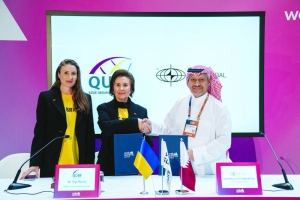‘Qatar strategically invests in digital infrastructure’

Doha, Qatar: The country’s Information and Communication Technology (ICT) sector spending is expected to amount to $9bn (QR32.8bn) by 2024, with a compounded annual growth rate of 9.2 percent, echoing a robust commitment for Qatar to position itself competitively in the region and across the globe.
However, this spending enables the country to strategically invest in digital infrastructure such as cloud services and high-speed connectivity, and strengthens its cybersecurity measures for data protection, a market expert said.
Speaking to The Peninsula, Joseph Abboud, Technology Consulting and Partner at PwC Middle East underlined Qatar’s commitment to enhancing the digital ecosystem and investments.
He noted that key initiatives including the digital factory, aim to transform the government into a citizen-centric service hub, facilitating seamless interactions and improving service delivery.
“By integrating emerging technologies like AI, blockchain, and IoT, Qatar is well-positioned to digitise 90 percent of its public services, boosting the local economy and attracting international investment, while establishing a robust and future-ready digital ecosystem,” the official said.
Abboud also stressed the country’s dedication to digital transformation is intensely rooted in Qatar National Vision 2030(QNV 2030), paving the way for long-term development goals.
Building on this, the third National Development Strategy (NDS-3) and the Digital Agenda 2030 (DA 2030) delineate strategic investments that help in advancing its digital infrastructure and economy.
In its recent Qatar Economy Watch report, PWC accentuates that Qatar stands out for its strategic emphasis on emerging technologies such as AI as a “key priority sector”.
By integrating AI into its NDS-3, the country anticipates accelerating its economic diversification efforts and leads the race in AI innovation.
“This reflects a broader vision to leverage cutting-edge technologies to enhance its global competitiveness and achieve sustainable development goals. Through targeted investments in AI research and applications, Qatar can continue to position itself as a strategic market within the global technological landscape, demonstrating a commitment to embracing the opportunities presented by the digital age,” Abboud said.
The national agenda is steered by various key pillars, with an emphasis on digital transformation, emerging technologies, and sustainability. The industry leader remarks that the country has a strategic focus on enhancing its integration across industries.
According to sources, the plan involves setting up an AI economic cluster and determining precise AI applications to boost its adoption in numerous industries. This approach is designed to propel technological advancement and reinforce economic competitiveness.
On the other hand, Qatar’s high internet usage rate, with more than 94 percent of the population connected, reflects the nation’s readiness to adopt and integrate AI technologies across all sectors including tourism, healthcare, and logistics.
In addition to that, approximately 40 percent of economically active Qataris have a university education, one of the highest rates in the world.
The analyst said that this workforce creates and carries out AI solutions, to drive economic diversification and technological advancement in the country.
Qatar’s favorable investment climate, on the other hand, underlined in PwC’s ‘Qatar Doing Business 2024’ report, indicates the country’s tax regime and attractive incentives for investors.
“From an ease of doing business perspective, Qatar has been rated as having one of the least demanding tax frameworks in the world. The FDI Law allows 100 percent foreign ownership in most sectors, giving investors full control, while the Qatar Free Zones offer tax exemptions and full capital repatriation, especially for logistics, chemicals, and tech sectors,” Abboud noted.
In the meantime, Qatar’s economy is anticipated to surge by 2 percent by the second half of 2024, driven by non-oil activities, demonstrating healthy diversification and investment opportunities.
The official said, “These favorable conditions encourage both local and international investors to channel their resources into Qatar’s digital landscape.”
On the other hand, robust cybersecurity, advanced digital infrastructure, and a stable regulatory framework are essential to achieving such goals as Qatar needs to persist in implementing international data protocols that go by global standards.
He further added, “This would facilitate secure and efficient cross-border data movement, which is vital for business operations.”
Moreover, aligning technology strategies with sustainable development goals makes sure that the growth remains consistent in the long run.
Related
QUBF launches ‘Qatar-Ukraine Tech and Innovation Committee’
Dr Olga Revina, chairperson of QUBF, and Sheikh Mansoor bin Khalifa al-Thani, fou
Initiative to support digital innovation in Qatar launched
Assistant Undersecretary for Digital Industry Affairs at MCIT Reem Al Mansoori, and General Manager of Microsoft Qatar Lana Khalaf exchanging documents after s
MCIT, Microsoft Sign Partnership Initiative to Support Digital Innovation and…
As part of its efforts to enhance digital innovation and support the growth of startups in the country, the Ministry of Communications and Information Technolog
IIA Qatar hosts session on tech-driven transformation in internal audit
Officials pose during the seminar hosted by Institute of Internal Auditor Qatar Chapter. Doha, Qatar: The Institute of Internal Auditor Qatar Chapter r












